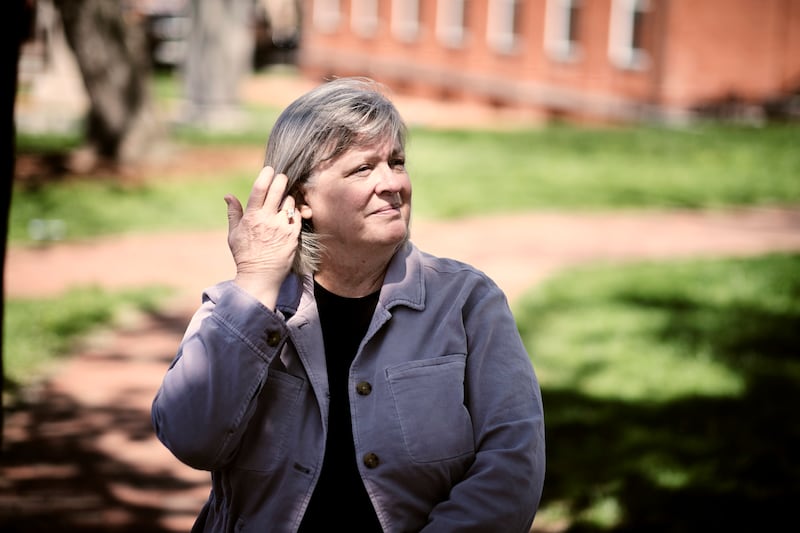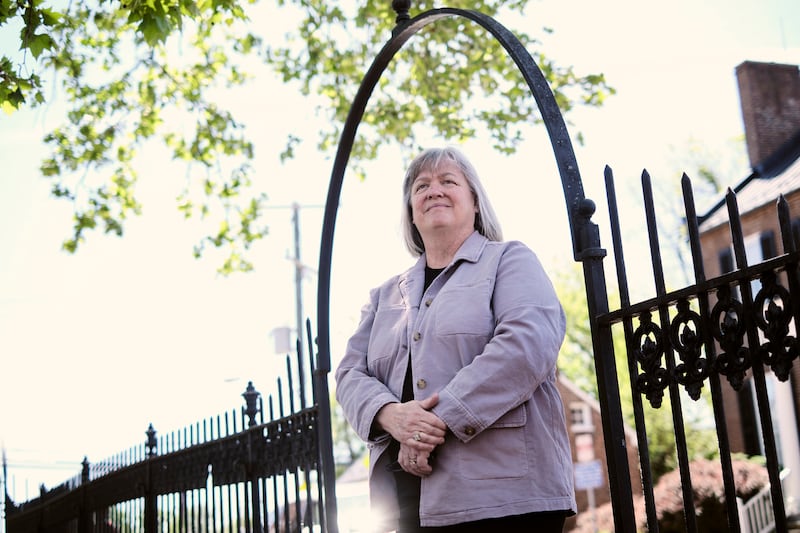Loudoun County resident Melaney Tagg was abhorred by the scene unfolding in front of her.
Tagg, who is stake Relief Society president for The Church of Jesus Christ of Latter-day Saints, is no stranger to listening to others express themselves with spirit and conviction. But what she witnessed when her local Loudoun County School Board abruptly ended public comment during a packed meeting felt more like mayhem.
Some attendees threw nearby objects, others yelled profanities and slurs while others clamored for the exits, trying to escape the scene unfolding in this quiet Virginia suburb.
Earlier that year the Commonwealth of Virginia mandated that school boards adopt transgender protection policies ahead of the 2021 school year. In Loudoun County — where tensions were already running high over COVID-19 masking policies, critical race theory and other polarizing issues — the proposed protection policies became a tipping point. Hundreds of attendees showed up to the school board meeting to vocalize their support of, or opposition to, the school board’s proposed 8040 policy, which outlined the rights of transgender and gender-expansive students.
Comments were limited to 60 seconds and were not to be met with any sort of crowd reaction — rules that school board members presented after having to shut down the meeting once already due to unruly behavior. After the 51st comment was met with loud applause from attendees against the 8040 policy, the school board ended the comment portion for good and instructed attendees to leave. Many refused to do so. Some became aggressive toward other attendees and others resisted arrest. They had come ready to fight.
Tagg felt compelled to apply her problem-solving and communication skills to try and bring the two sides of the polarizing issue together. She has what she calls “the gift of gab” and a Rolodex full of people willing and eager to take her calls.
One of those people was her friend and co-religionist Chris Stevenson who runs the Community Levee Association of Loudoun County. Tagg, Stevenson and their friend Alice Parkin decided to leverage the CLA to try and bring the so-called religious right and the LGBTQ+ communities together and draft revisions to the 8040 policy to better address the concerns of every parent and student in the district. They looked to the landmark 2015 “Utah Compromise” as a blueprint for what they hoped to accomplish. The legislation afforded anti-discrimination protections for queer Utahns and religious liberty protections for faith-based organizations, and the CLA members felt confident similar compromise might be reached in Loudoun County.
The time when the school board would vote to adopt 8040 was right around the corner, so Tagg and the CLA had to act fast. They scheduled a meeting and invited representatives from Equality Loudoun as well as some of the attendees from the school board meeting who had been vocal in their opposition to 8040. They soon learned that some names in the latter group posed a problem for the members of Equality Loudoun, who feared they were walking into an ambush.
So Tagg and her team decided to hold two meetings with the two separate factions. Their meeting with Equality Loudoun helped the Equality members realize the CLA was truly a nonpartisan, nonreligious entity, and that Tagg, Stevenson and Parkin could be trusted to create an atmosphere for an honest and productive conversation. In their meeting with those opposed to 8040, however, the CLA members learned that for the attendees they had invited, the issue was not really about religious freedom. In order to best follow the Utah Compromise blueprint, they decided to identify and invite attendees who were concerned with the religious liberty implications of 8040.
They found three such attendees, all leaders of various congregations, and invited them to join a second meeting with three representatives of Equality who were now willing to meet with the larger group.

In preparation, Tagg and her team sought the advice of human behavior experts to best understand how to get the opposing sides to a place of trust. “We knew the only way for any conciliatory progress was for people to trust each other,” she says.
Angela Smith Knoll agreed to represent the traditional religious perspective during the meeting. She had raised her children in Loudoun County, had a deep love for the school district and the opportunities it had provided her children, and was concerned that a poorly implemented 8040 policy would inhibit parents, especially religious parents, from having an influence over their children’s education. She feared the CLA meeting might mimic the infamous school board meeting, and was prepared mentally for more rancor and debate.
While some of the fears Equality Loudoun’s President and Director of Operations Cris Candice Tuck had previously held were assuaged by his first meeting with CLA, he and his officers still had a measure of trepidation walking into a conference room with the religious representatives. They were prepared to be on the defensive.
Knoll and Tuck both understood that the current model of discourse was not serving their interests, nor the interest of the students in the school district. And both Knoll and Tuck understood that the situation required honest conversations, not sound bites and diatribes.
At the start of the meeting, Tagg surprised everyone by explaining that they might not even get around to discussing 8040 that day. The main purpose of the meeting, she said, was to build trust among the participants.
They began with what Tagg describes as “silly trust exercises” that highlighted the attendees’ capacity for productive cooperation. By the end of the exercises, the attendees were laughing together and sharing their common experiences.
Next, Tagg asked if everyone felt there was enough trust in the room to discuss 8040. The answer was a unanimous yes. Tagg issued an assignment — attendees were to listen to what each other person said about why they supported or opposed the policy, and identify any commonalities they had with those statements.
Tuck was surprised to learn that Knoll and the other religious liberty representatives understood, and did not object to, the need for facility access for transgender students. Knoll was moved by the stories of many gay, gender-expansive and transgender students trying to navigate their day-to-day challenges in school and at home.
At the end of their three hours together, the group reached a consensus on nearly every 8040 policy point. Working from a shared document from their homes, they drafted 10 policy suggestions to send to the school board ahead of their vote. The meeting attendees unanimously agreed to present eight of those suggestions along with a letter explaining the process they had used to draft the suggestions. “May we say what a profound experience this was for us. We firmly believe that these methods of trust and conciliation could be used in a whole variety of ways on a whole host of issues,” it reads.
Soon members of the school board began calling, asking more about how and why CLA had brought the two sides together. “I wish we had done this,” one school board member is reported to have written in an email.
The school board presented two of the policy suggestions in their meeting and one of the suggestions, which required modernizing all locker rooms and bathrooms to ensure privacy, was passed as an amendment to 8040.
But the real success, in Tagg’s view, was the hugs shared between meeting attendees at the end of their three hours together, and their ongoing friendship. Knoll says she was surprised by the warm feelings she felt toward all the other meeting attendees by the day’s end.
“That was an unexpected gift,” she says. “When you meet as individuals, you become allies. You work together, not against each other.” Tuck reports the meeting was successful in helping every attendee find common ground. “At the core, everyone cared for the well-being of children,” he says. “When we truly understood the issue, we had a lot of common ground.”
Tagg and the CLA are under no delusions that they solved all of the county’s problems within a few weeks' worth of meetings. And the Loudoun area remains a hotbed of divisiveness. Plenty of work still needs to be done, and that work will be difficult. But now they have proof of concept.
So says retired Judge Tom Griffith, who recently made news as a Republican-nominated judge who introduced Judge Ketanji Brown Jackson before the Senate Judiciary Committee during her Supreme Court confirmation hearing. Griffith, a fellow Loudoun County resident and Latter-day Saint, watched in admiration as Tagg and her team dug in and did the work necessary the Constitution requires.
“Compromise for the sake of unity is hard work,” Griffith says. “You have to give up some things valuable to you for the sake of another, hoping that they will do the same for you. But this is what the Constitution requires. The Constitution will fail if we aren’t willing to compromise for the sake of unity.”
“We’ve got to be willing to listen to each other. If we don’t, we’re doing a great disservice to ourselves and our children,” Tuck says. “If we don’t grow as people, we’ve really stopped living.”
Tagg and CLA members are anxious to implement their system of trust-building, conversation and compromise wherever it may be needed. “I hope we find ways to insert ourselves in local issues,” Tagg says. “We want to opposing sides see there is a humane middle ground.”


